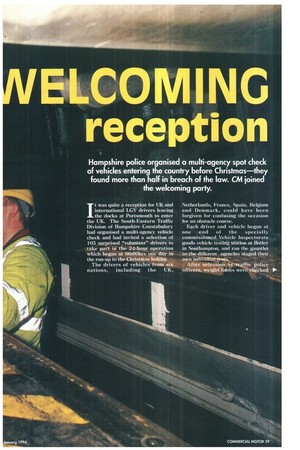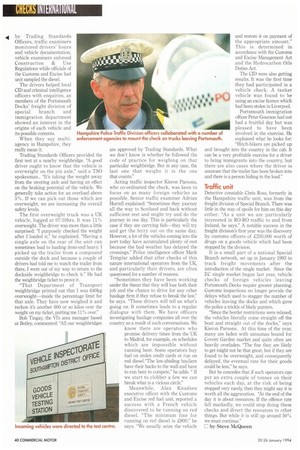COMING
Page 41

Page 42

If you've noticed an error in this article please click here to report it so we can fix it.
reception
by Trading Standards Officers, traffic examiners monitored drivers' hours and vehicle documentation, vehicle examiners enforced Construction & Use Regulations while officials of the Customs and Excise fuel unit sampled the diesel.
The drivers helped local CID and criminal intelligence officers with enquiries, as members of the Portsmouth Docks' freight division of special branch and immigration department showed an interest in the origins of each vehicle and its possible contents.
When they say multiagency in Hampshire, they really mean it.
Trading Standards Officers provided the first test at a nearby weighbridge. "A good driver ought to know that the vehicle is overweight on the pin axle," said a TSO spokesman.. "It's taking the weight away from the steering axle and having an effect on the braking potential of the vehicle. We generally take action for an overload above 5%. If we can pick out those which are overweight, we are increasing the overall safety levels.
The first overweight truck was a UK vehicle, logged at 07:10hrs. It was 11% overweight. The driver was more than a little surprised: "I purposely checked the weight after I loaded it," he explained. "Having a single axle on the rear of the unit can sometimes lead to loading front-end heavy. I picked up the trailer from a compound outside the dock and because a couple of drivers had told me to watch the trailer from there, I went out of my way to return to the dockside weighbridge to check it." He had the weighbridge ticket to prove it.
"That Department of Transport weighbridge printed out that I was 640kg
overweight—inside the percentage limit for that axle. They have now weighed it and reckon it's another 600 or so kilos over the weight on my ticket, putting me 1100 over."
Bob Tingay, the VI's area manager based at Botley, commented: "All our weighbridges are approved by Trading Standards. What we don't know is whether he followed the code of practice for weighing on that particular weighbridge. But in any case, the last one that weighs it is the one that counts."
Acting traffic inspector Kieron Parsons, who co-ordinated the check, was keen to focus on as many foreign vehicles as possible. Senior traffic examiner Adrian Hurrell explained: "Sometimes they journey all the way to Scotland and back without sufficient rest and might try and do the journey in one day. This is particularly the case if they are carrying fish—they will try and get the ferry out on the same day. However, a lot of the vehicles coming into the port today have accumulated plenty of rest because the bad weather has delayed the crossings." Police intelligence officer Mark Templar added that after checks of this nature international operators from the UK, and particularly their drivers, are often questioned for a number of reasons.
"Sometimes they have been working under the threat that they will lose both their job and the chance to drive for any other haulage firm if they refuse to break the law," he says. "These drivers will tell us what's going on. It sometimes leads to a regular dialogue with them. We have officers investigating haulage companies all over the country as a result of such conversations. We know there are operators who promise delivery times from the UK to Madrid, for example, on schedules which are impossible without running bent. Some operators buy fuel on stolen credit cards or run on red diesel."The law-abiding hauliers have their backs to the wall and have to run bent to compete," he adds. "If we start to clobber a few we can break what is a vicious circle."
Meanwhile, Alan Knudsen executive officer with the Customs and Excise red fuel unit, reported a success with a French vehicle discovered to be running on red diesel. "The minimum fine for running on red diesel is £800," he says. "We usually seize the vehicle and restore it on payment of the appropriate amount." This is determined in accordance with the Customs and Excise Management Act and the Hydrocarbon Oils Duties Act.
The CID were also getting results. It was the first time they had participated in a vehicle check. A tanker vehicle was found to be using an excise licence which had been stolen in Liverpool.
Portsmouth immigration officer Peter Gourson had not had a fruitful day but was pleased to have been involved in the exercise. He explained what he looks for: "Hitch-hikers are picked up and brought into the country in the cab. It can be a very profitable exercise for a driver to bring immigrants into the country, but there are also cases where the driver is unaware that the trailer has been broken into and there is a person hiding in the load."
Traffic unit Detective constable Chris Ross, formerly in the Hampshire traffic unit, was from the freight division of Special Branch. There was little in the way of spoils for him on this day either: "As a unit we are particularly interested in RO-RO traffic to and from Ireland, he says." A notable success in the freight division's first year was the discovery by customs officers of £250,000 worth of drugs on a goods vehicle which had been stopped by the division.
It is a small part of a national Special Branch network, set up in January 1993 to track freight movements after the introduction of the single market. Since the EC single market began last year, vehicle checks of foreign vehicles leaving Portsmouth Docks require greater planning Customs inspections no longer provide the delays which used to stagger the number of vehicles leaving the docks and which gave the police a trickle of likely punters.
"Since the border restrictions were relaxed, the vehicles literally come straight off the boat and straight out of the docks," says Kieron Parsons. At this time of the year, many are laden with satsumas bound for Covent Garden market and quite often are heavily overladen. "The fine they are likely to get might not be that great, but if they are found to be overweight, and consequently delayed, the eventual rate for their goods could be less," he says.
But he concedes that if such operators can put an extra couple of tonnes on their vehicles each day, at the risk of being stopped very rarely, then they might say it is worth all the aggravation. "At the end of the day it is about resources. If the offence rate fell markedly, we could stop doing these checks and divert the resources to other things. But while it is still up around 509 we must continue."
L by Steve McQueen




















































































